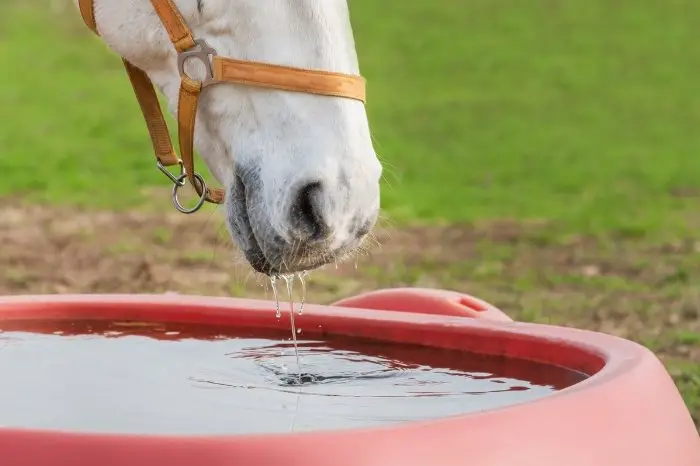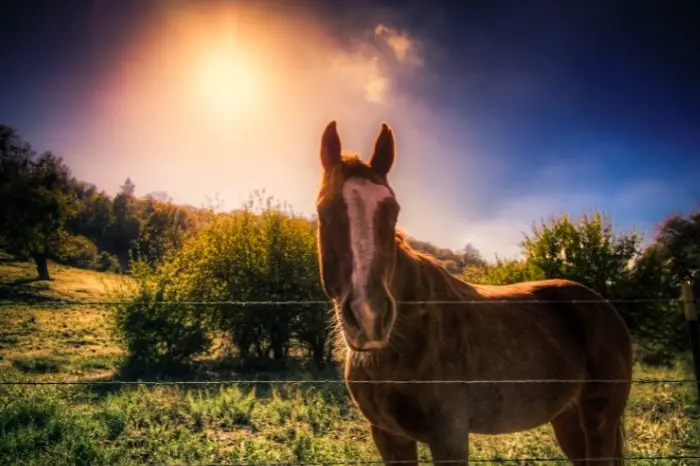Last Updated on April 18, 2023
It can be very worrying if you suspect your horse is not drinking enough, especially after exercise or on a hot day. But how long can a horse go without water before they start to have problems?
At some point in your horse’s life, you might find that he does not drink as much water. This could be for a variety of reasons, including old age, ill health, or high levels of stress and anxiety. If you are worried that your horse does not have access to water, it is important to know how long horses can go without drinking water.
It could also be the case that your horse cannot drink water for some reason – maybe because of a medical problem or due to management restrictions. In this case, how long is it safe for horses to go without water?
How Much Water Do Horses Drink a Day?
To understand how long horses can go without water, firstly we need to understand how much horses drink. This varies widely for several reasons, as we shall find out.
Horses need to consume a certain amount of water each day to keep healthy. In veterinary terms, this is calculated as 50 milliliters of water per kilogram of body weight every 24 hours. So, an average 500-kilogram horse needs 25 liters of water per day just to survive.
However, it is not quite as simple as this! This is the bare minimum amount of water a horse needs to maintain its basic body functions.

Many other factors also affect the amount of water a horse drinks a day, including:
-
Size of horse
It may seem obvious, but larger horses need to drink a lot more water! A miniature horse may only need 5 to 10 liters of water per day, whereas a large draft horse could drink up to 100 liters every day.
-
Weather conditions
In hot weather, horses will need to drink more water. This is because they lose a large amount of water through sweating, in an attempt to keep cool.
-
Diet
The food your horse eats may or may not contain water, and this will affect how much your horse needs to drink. For example, grass contains 83% water, but hay contains less than 18% water. A horse fed entirely on hay will drink much more water than one out in the grass.
-
Exercise levels
During intense exercise, horses lose a lot of water through sweat and respiration. A fit and active horse will drink a lot more water than one that does very little exercise.
As we can see, many factors affect how much water a horse needs to drink. A horse that lives out on the grass in a cool climate and does very little exercise will drink 25 to 55 liters of water per day. A horse living in a hot country, with an intense exercise regime and that eats only hay, may drink at least twice this amount.
Little Giant Plastic Animal Feed Bucket (Purple) Flat Back Plastic Feed Bucket with Metal Handle
How Long Can a Horse Go Without Water?
One of the most important rules of caring for horses is to allow them access to clean, fresh drinking water at all times. Water is one of the most essential nutrients for life, and without it, a horse will quickly die.
After 48 hours without water, a horse may start to develop health problems. The severity of this depends again on the horse and its circumstances. A horse that can access lush grass can survive for long without water than one which eats only dried hay.
What Happens If Horses Go Too Long Without Water?
If a horse goes too long without water, it will start to become dehydrated. This means that the body does not contain enough water to function normally.
Water makes up an incredible 65% of your horse’s body and is essential for life. When a horse does not have access to water, it will quickly start to become dehydrated.
When dehydration occurs, the horse is not able to maintain its normal bodily functions. The blood becomes thick and viscous, making it harder for the heart to pump it around the body. Levels of electrolytes in the body will also become imbalanced, leading to cellular dysfunction and death.

If left untreated, dehydration will quickly lead to death. A dehydrated horse may be too sick to drink water, so prompt veterinary attention is required to rehydrate the horse.
Read more about Miniature Horse Lifespan Facts And Figures Revealed!
How to Tell If a Horse is Dehydrated
A dehydrated horse may show a wide range of clinical symptoms. As a horse owner, you must learn to recognize these signs of dehydration. The sooner a horse with dehydration is treated, the better chance it has of surviving.
A dehydrated horse will be lethargic and depressed, and the eyes will appear sunken and dull. The inside of the mouth will be dry, and any saliva will be thick and gelatinous. If a horse is dehydrated the flanks will be tucked up and he will pass very little urine or feces.
When dehydrated, the horse may also show signs of fatigue and may start to tremble. The muscles will become stiff and sore, particularly if dehydration occurs during exercise. The heart rate of the horse can also be elevated, and the heart itself might start to beat irregularly.
The skin pinch test is a quick and easy method to judge if a horse is dehydrated. Take a fold of the horse’s skin on his neck and pinch it upwards. Release the skin and observe what happens.
In a healthy, hydrated horse, the skin will immediately pop back into its original position. If the skin remains in a ridge or takes more than a few seconds to return to position, then the horse is suffering from dehydration. If you are concerned that this is happening to your horse, call for veterinary help immediately.
Can a Horse Go Overnight Without Water?
Theoretically, a horse could go overnight without water, but this is not healthy for a horse. An average-sized riding horse needs to consume 25 liters of water per day, and they will drink at least half of this overnight. Depriving a horse of water for long periods can lead to dehydration and other health problems.
The other issue with leaving a horse without water overnight is that they will drink a lot of water very quickly when they get the opportunity, which may cause bloating and colic. If your horse has accidentally been left without water overnight, offer 1/4 bucket of water every 20 minutes or so until your horse is no longer thirsty.
How far can a horse go without water?
If you are planning a long trail ride with your horse, one of the most important things to remember is to allow plenty of opportunities for your horse to drink. You may have natural water sources along the way, such as streams, lakes, and rivers, where your horse can take a drink. If not, you will need to take water along with you.
For exercise that is not too strenuous, stopping every two to three hours for a rest will give your horse a chance to have a drink and a small amount of feed. However, if you are doing an intense physical activity where your horse loses a lot of water through sweat, you will need to allow your horse to drink more frequently than this.
A prime example of this is during endurance racing competitions, where contestants race each other over distances of up to 100 miles per day. Because the risk of dehydration is so high, competition rules state that the horses must have mandatory vet checks at rest stops along the route. This allows the opportunity for the horse to eat and drink, and each horse must be passed as fit by a veterinarian before it is allowed to continue.
Why Do Horses Eat Snow?
Horses will play with snow, licking at it and attempting to eat it. However, horses cannot stay adequately hydrated by eating snow, and consuming too much snow may even be detrimental to your horse.
The reason for this is that a horse would need to eat a lot of snow to meet their daily water intake requirements, and snow is very cold! So, eating large amounts of snow will reduce your horse’s internal body temperature, and they will use up more energy trying to stay warm.
On snowy days, make sure your horse has access to clean, fresh drinking water that is not iced over. Remember that if the grass is completely covered in snow, you will also need to provide additional roughage such as hay.
Summary
So, as we have learned, horses can go without water for up to 48 hours, but this is very dangerous for the animal. Horses should be able to access fresh, clean drinking water whenever they need it. Reduced access to water can cause health problems including colic and life-threatening dehydration.
We’d love to hear about your experiences – do you find that your horse drinks very little water when he is out grazing? Or maybe you are worried that he does not drink enough water in hot weather? Add a comment below this post and we’ll get back to you!

Kate Chalmers is a qualified veterinary nurse who has specialized in horse care for the vast majority of her career. She has been around horses since she was a child, starting out riding ponies and helping out at the local stables before going on to college to study Horse Care & Management. She has backed and trained many horses during her lifetime and competed in various equestrian sports at different levels.
After Kate qualified as a veterinary nurse, she provided nursing care to the patients of a large equine veterinary hospital for many years. She then went on to teach horse care and veterinary nursing at one of the top colleges in the country. This has led to an in-depth knowledge of the care needs of horses and their various medical ailments, as well as a life-long passion for educating horse owners on how to provide the best possible care for their four-legged friends.
Kate Chalmers BSc (Hons) CVN, Dip AVN (Equine) Dip HE CVN EVN VN A1 PGCE

